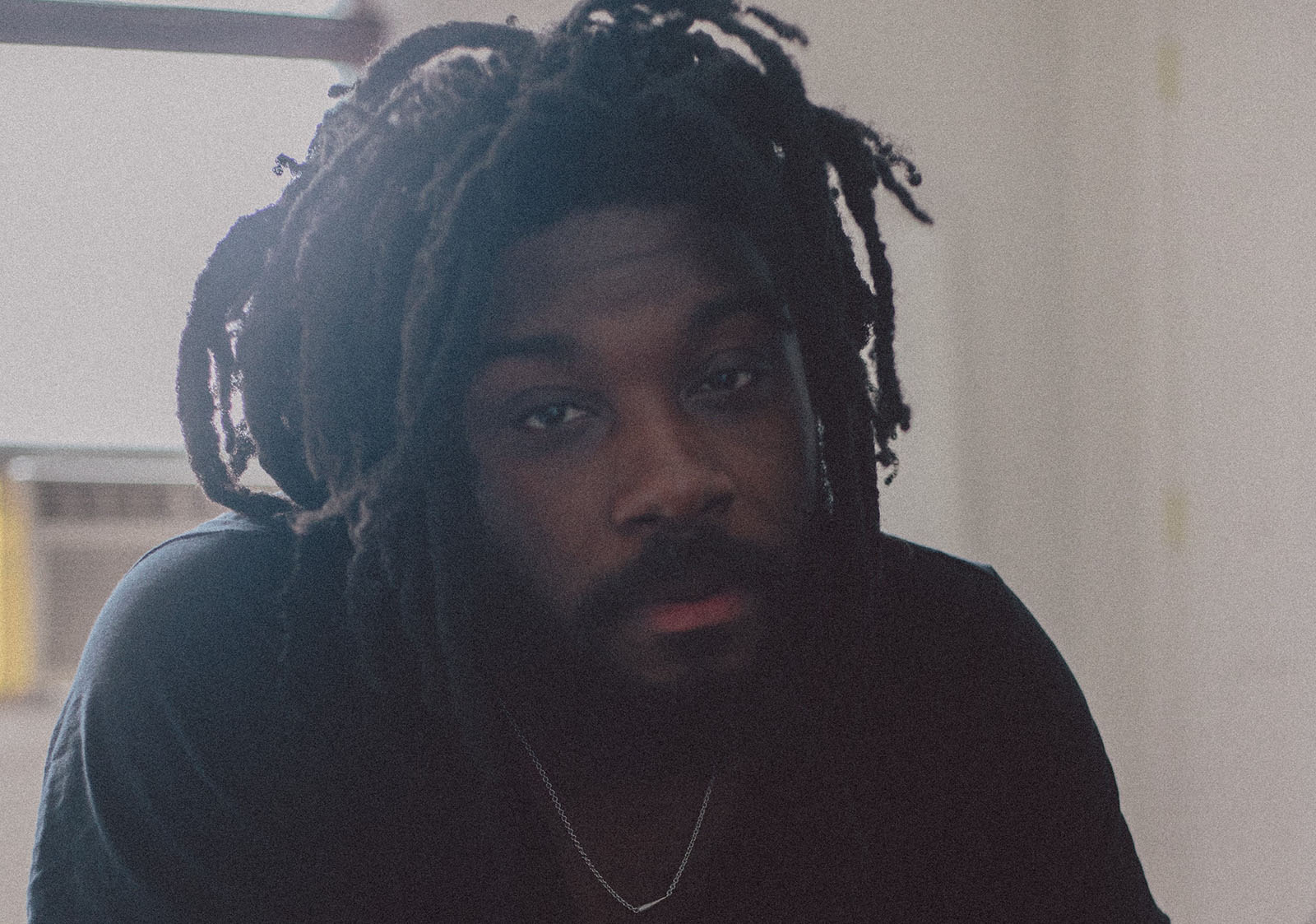
JASON
REYNOLDS
What would it mean to care for young people as whole people, not half-formed beings? How does knowing oneself allow us to find a resonant frequency with others?
Photograph by Nathan Bajar
Watch our conversation with Jason Reynolds and read along below.
Video Transcript
Jason Reynolds is the award-winning and best-selling author of novels, non-fiction, and poetry for young adult and middle-grade audiences. In 2020, two of his books were among the top ten most challenged books released by the American Library Association.
The one thing that younger people always say is "Yo man, thank you for speaking to us like humans, for speaking to us like people, and for not talking down to us as children. For making it clear that we are not half-formed things, we are whole-formed things who happen to be younger than you."
Who gonna tell you the truth like children, right? Who gonna hold you accountable like children? Young people tell you the truth.
Resonant Frequency
First, I try not to think of myself as an adult. I mean, if words truly mean things, then "adult" is loaded. Adult is a loaded word. I'm an older child, a 37-year-old child. And because I like to think of myself that way: the way that my work cares for me is, every day, I've got to hold on — first, I've got to hunt down and tap into 16-year-old Jason, 12-year-old Jason, and I've got to hold that Jason close because it's that Jason that got it right. It's that Jason that understood how important it is to have a buzzing imagination, whose imagination was still functioning at a high clip because the world hadn't robbed them of it yet. And so I have to go to that place and tap into that person and stick real close to them.
So if I can love my 12-year-old self at 37, if I can love my 16-year-old self at 37, then it's much easier for me to do the work of caring for other 12-year-olds and 16-year-olds.
I know you because I know me. The only way that I can write something that connects to you is if I know me. I have to be intimately connected to the human parts of myself, because it's the human parts of me that are going to connect to the human parts of you.

I'll give you an example: in engineering, there's a term called resonant frequency. Everything resonates at a particular frequency and if you match the frequency, you can cause the thing to crumble. It's the reason why in history there have been bridges that have just fallen down, because the wind hits a certain frequency that sets off the chemicals in that bridge — the things that bridge is made of — and that frequency can bring that bridge down. It's the reason that an opera singer can crack a glass, with resonant frequency.
How does one find the resonant frequency? One has to know what the thing is made of. So for instance, here is a glass. If I clink the glass and I hear that sound, if I match my voice to that sound — that frequency — and I sustain it, then it will crack the glass. Which means that in order for me to shatter something — to break through a wall, to penetrate anything — I first have to know what it is made of and then I have to match it with what I am made of, and sustain it, and it will crumble the wall. That is how I feel about connecting to children. That is how I feel about caring for children.
I am who I am every day. This is it. I don't have the energy to be other people. So if I'm in front of a bunch of 13-year-olds, this is the way we're speaking, right? Like this is it. And ninety-percent of the time, they meet me there, and I say, "I'm telling you all this because I'm certain you can handle it. I'm right, right?" and all the kids are like, "Of course." They don't want to break my trust because they know I respect them enough to trust them with it. It's an amazing sort of experience to have over and over.
But that is the resonant frequency.
I'm saying, "I can see you for who you are, not for who they perceive you to be." So if I acknowledge you for who you are, you are willing to actually be that thing — and then the glass breaks.
Tending Imagination
with Language
I was cared for by language, and therefore I care for others through language. I never got the 'goo-goo ga-ga' in my household. It was always sort of, "This is a young human. And this young human has a range of emotions, has thoughts, some of which he cannot articulate as of yet but I'm going to pour into him the only thing that I have at this moment besides physical touch, which is the sound of language."
What does it mean for a mother to tell her child that he cannot go to bed at night until he says to her with confidence that he can do anything and that everything he touches turns to gold — because that's what my mother made me do.
So when I became a 12-year-old or a 16-year-old or a 21-year-old, I did not know anything other than excellence because my entire life was about believing that I could do whatever I wanted. Couldn't nobody tell me nothing because I believe that whatever I put my hand on, if I try hard enough, I'll make it go because those words live in my body, they live in my psyche.
I think we underestimate how restricting school is. It's mad oppressive. Honestly, I understand what it's for, I get it. But structurally, it's wildly oppressive.
I want to make sure that young people know that brains can do more than what they think they can do, and imagination is a way to push that, right? It's a way to stretch you out a little bit, like "How do we make words? Can we make up words?"

I have to be honest about the fact that I am writing with young people in mind, because if I'm not writing with young people in mind, there's a good chance I'm going to miss the mark.
Everything has to be named in order for it to actually exist in our lives. In order for it to make sense to us, it has to be named. All of our spiritual practices, no matter what that spiritual practice is, whatever the sort of 'big thing' in that spiritual practice, even though it's incomparable, it still has been given names. Historically, we have to name a thing that we can't even actually touch in order for it to be real to us, right?
So because I know that to be the case, I take it seriously — I have to take it seriously — because I think if I do it right, it can actually serve as a blanket for people. It can serve as a safety net, it can be used as a bunker, as an incubator, and as a space for ultimate care when it comes to — for me, particularly — when it comes to our children.
Creating Space
(for young people)
Just bring young people in the room, that's all. Every single place that is doing anything about around care, specifically in this context care for young people, needs to have young people in a room. Ask them what they need. It's really weird that we make all these decisions without asking them any questions. Ask them what they need.
And the reason why we don't ask them is because it's because we don't respect them. We don't respect their opinions, or their ability to articulate what it is that they need, which means that we don't actually see them as whole human beings. And then we create structures that are supposed to edify and fortify them. But how could you do so if you don't exactly know the subject in which you're building a support system around? It's foolishness.
Tony: "Why did you decide to leave it off there? Why didn't you continue on with it?
Jason Reynolds: "Tony, at the end of the day, brother, whatever comes next in that story is up to you. I gave you 250 pages, I'm only asking you to write one."
I think that's all I really want young brothers to know: be free. Be yourself, whatever that feels like. Feel your feelings. Treat yourself like a human being even when the world refuses to. If you can treat yourself like a human being, and if you can be whole, if we can help you be whole and you aren't lacking anything, then you need not take anything from a girl.
I know for some of the brothers, they fight back and we have some exchanges and I let them be tough, but I also let them know that I love them: "In the midst of all of that, I still love you, brother, I love you."
They get all squirmish and I tell them to their faces, "I'm gonna keep telling you I love you until it feels comfortable." You have to get used to a man looking you in the face and telling you he loves you. It shouldn't make you uncomfortable, it shouldn't make you weird in your skin. So I'm gonna keep saying it until you can just look me in the face and say "I love you too." That's all.
Creating Space
(for adults)
I think for me, it's important that young people know that there are adults in their lives that love them and that those adults are flawed. But that doesn't mean that they don't love them, right? There are people in their lives who care for them.
Life has sometimes presented things to us that we haven't quite dealt with either, that we are also emotionally immature and we — and unfortunately sometimes you — bear the brunt of that unfairly. But it doesn't mean that we don't love you. It's that we're still human.
It took a long time for me to see my mother as a human being, and once I was able to, it was much easier to forgive her. Unfortunately, it took me to become an adult to make my own mistakes to realize, "Oh, now I see." But I wonder if I'd have had those examples in books when I was younger if it would have been a little bit easier to sort of reconcile. And then the other thing is, I want to make sure adults see what it could be: this is what you could be doing, this is how you could be.
You seen Maxine Waters this morning talking to Megan thee Stallion, did you see that clip? That's how it's supposed to be, yo. Lead with love, not judgment! Lead with love, right? She said "It's okay, it's okay. That's what audacity looks like." And I thought to myself, that's what an OG is supposed to be. You're not supposed to be slapping my wrist just because it don't sound like it used to sound like when you were my age. You're supposed to look for the thing you appreciate in it, look for the thing you love.
Listen, I may not understand it all, but I can respect the fact that you did it and you said it. That takes audacity and courage, and I love you for that.
Humility, intimacy, gratitude
There are only three things necessary, three things: humility, intimacy, and gratitude. That's it. If you can extend those things, then this reciprocal care between older child and younger child becomes natural.
The greatest influence that any human being has is another human being. The issue is that some of us don't see other human beings as human beings, therefore the natural process of reciprocity is cut. But all we need to do to extend our humanity to another person is exercise humility, intimacy, and gratitude.
I have to be able to — just as I've been trying to do in this process over the course of this interview — I have to be able to say "I'm sorry" or when I'm wrong, and to try to atone for it. I have to be able to say "I don't know."
Teach me despite your age — OG or little youngin' — show me the way. If you know better, show better because I might not know the answer. I don't have the answers. I'm okay with that. I'm not afraid to say: "I am afraid, "I am insecure," "I have mental illness." We have to sort of extend that because what will be offered back to you is humility.
You got young men out here who feel like it is dangerous to exercise humility, and for a lot of them, it is. But it's more dangerous to not exercise it. It's more dangerous to never learn how to exercise it. If you feel like you have to cry, it's because you have to cry. To fight against that is to poison oneself
So I'm going to create a safe space for you even if it's only in the pages of these books to let you know it's okay for you to be scared. It's okay for you to cry, young brother, it don't mean you soft — it means you're human.
Furthermore, what is wrong with being soft? What is the matter with being soft? I don't know why hardness is the only thing that we can exercise. I don't want to be just one thing, I am a whole person with a range of feelings and emotions. There are parts of me that are hard for sure, and there are parts of me that can't stand to watch commercials because I cry so much. And I'm okay with all of it.
Then we have to exercise a bit of intimacy. But that intimacy comes from the humility. It literally bleeds right into it. We ask young people to give of themselves — tell me your whole story, tell me what you're going through — and they don't know nothing about us. How dare we ask them to trust us when they don't know us? You've got to give a little bit right, you've got to give a little intimacy. Let them know, "I too have seen some things. I too have been through some things."
And then lastly, gratitude don't never go out of style. There's never been a moment in the history of the world with gratitude has been a bad thing.
Say thank you to the shorties. You want to let them know that you care for them? Say thank you. Say thank you for them just being who they are, because without them, don't none of us have no purpose. The least we could do is thank them.
What we do is say, "I don't owe them nothing, they owe it to me." No, they don't owe you nothing. They don't owe you nothing. But if they don't walk into your classroom, you ain't got no job. The least you could do is say thank you. Some of them have had to jump through hoops to get there. That's a real thing.
Humility, intimacy, gratitude, and then that cycle — that natural cycle of human care — it moves on its own axis.

